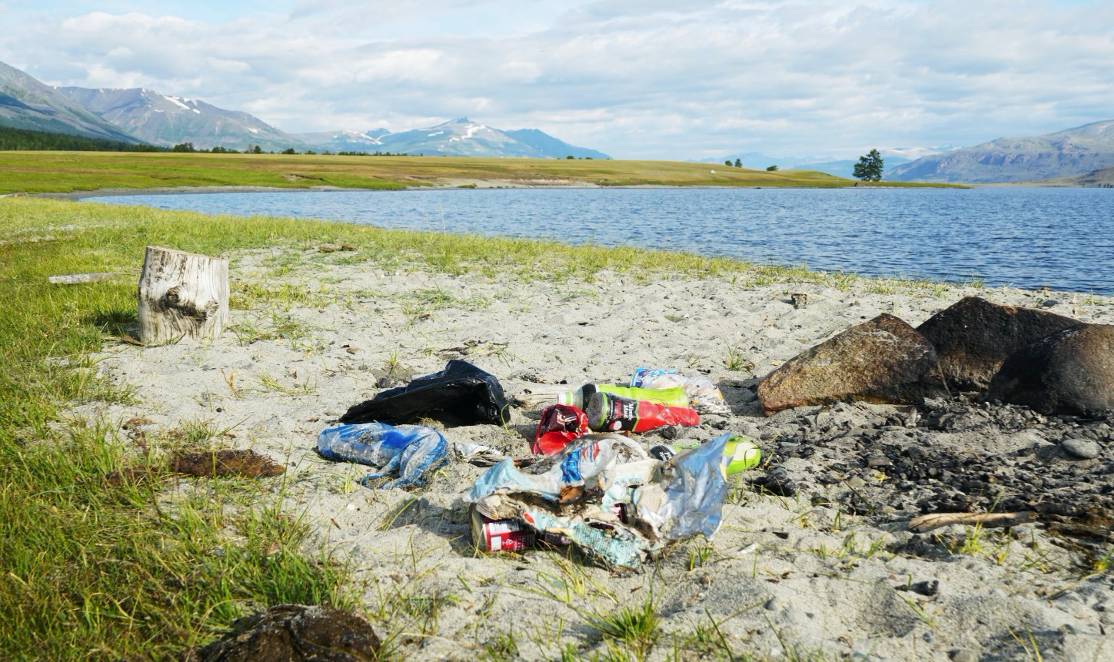
Celebrated on the 3rd of July, International Plastic Bag Free Day, is a global initiative that aims to curb the use of plastic bags and promote a living without throwaway plastic goods by looking for safer alternatives. Although plastic goods have made our life more convenient, their negative environmental impact is tremendous throughout the life cycle.
Countries in East Asia and the Pacific are at the center of the plastics crisis, with some countries in the region representing the biggest contributors and others disproportionately affected by the impacts of marine plastic debris on their shores, as reported by the WorldBank.
In this context, Mongolia is also struggling to implement clear binding policies and targets on plastic reduction and single-use plastics bans. Although in 2018 the Government of Mongolia banned the use, sale, import and production of single-use plastic bags thinner than 0.035 mm, the latter are still being widely used in the country.
The EU-funded SWITCH-Asia Sustainable Plastic Recycling in Mongolia (SPRIM) project is working towards beating plastic pollution through the adoption of circular approaches.
The European Union is taking action to tackle plastic pollution and marine litter and to accelerate the transition to a circular plastics economy in policy and practice. In Mongolia, plastic waste is becoming an issue due to both a lack of plastic recycling awareness among the general public and the absence of official plastic waste sorting, collecting and recycling mechanisms. Through the SPRIM project the EU Delegation is aiming to develop a model for sustainable plastic recycling at both city, district and sub-district levels. We hope this pilot could then serve as model for nationwide replication, said H.E. Ms Axelle Nicaise, Ambassador-designate of the European Union to Mongolia.
As stated in its Zero Waste and Circular Economy: The Way Forward - Position and Recommendations Report (2021), SPRIM’s position is to:
1. Be transparent about the limits and drawbacks of recycling to avoid counterproductive disincentive effects on waste reduction;
2. Condemn and forbid misleading use of the term “recyclable” when recyclability is only theoretical and limited operational recycling processes are implemented in Mongolia;
3. Push industries to systematically switch to reusable packaging and organize reusable packaging take-back;
4. When products cannot be made reusable:
- a. Promote priority use of recyclable materials;
- b. Ban non-recyclable materials when a recyclable alternative exists;
- c. Condemn designs that make effective recycling impossible, even when theoretically recyclable materials are used;
5. Push the packaging industry to:
- a. Reduce the range and number of materials they use, especially in terms of plastic types; stop making multi-material packaging that can’t be effectively recycled;
- b. Standardise packaging by type of product for all companies and brands, both for reusable and recyclable packaging;
6. Encourage people to adapt their consumers’ habits so as to reduce waste generation in the first place, and/or to favor reusable items and packaging;
7. Call for extensive waste sorting not just by households (who actually produce less than 10% of all waste) but by all waste producers, especially industries (which produce most of our trash);
8. Use extensive sorting not only for direct recycling but also to produce data so as to better understand what non-recycled products and brands currently make up most Mongolian waste and subsequently advocate for adequate measures to be taken.
In practice, how does the SPRIM project act on plastics issues?
To combat plastic pollution, SPRIM is raising public awareness on the 5Rs: Refuse, Reduce, Reuse, Repurpose, Recycle. The project is also building capacities of civil society organizations that are conscious about plastic waste management and is implementing pilot initiatives to better manage plastic waste in rural and urban areas in Mongolia. Furthermore, the team has conducted in-depth assessments and research studies to figure solutions that can support local MSMEs in the plastic recycling industry.
The first fully operational waste management facility was established in the rural area of Khishig-Undur soum of Bulgan province:
In March 2022, the first fully operational waste management facility was established in Khishig-Undur soum (rural area) of Bulgan province of Mongolia. Numerous soum inhabitants have adopted the habit of delivering their sorted waste at the new facility rather than throwing it directly into the landfills.
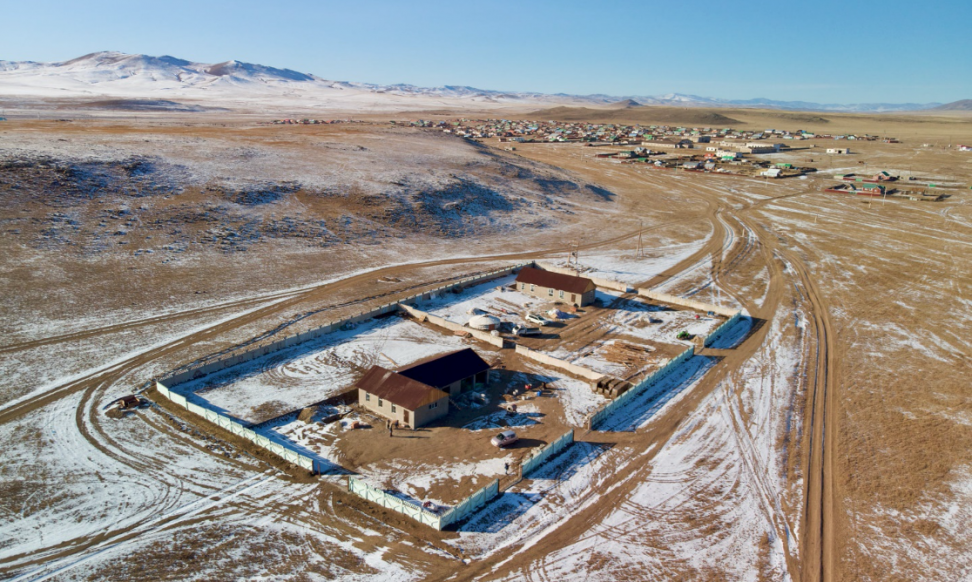
At the soum level, the project has so far:
- Collected 6.000 PET bottles for the new waste management facility over the course of two years;
- Organized capacity-building training sessions for civil society organisations (CSOs) in waste management and involved 28 more organisations to join the project’s activities;
- Distributed 77 waste sorting bins to households in an area with a total population of 3.056 residents and 988 households;
- Organised a “Training of Trainers” programme and involved 9 teachers of secondary schools and kindergartens from Bulgan soum.
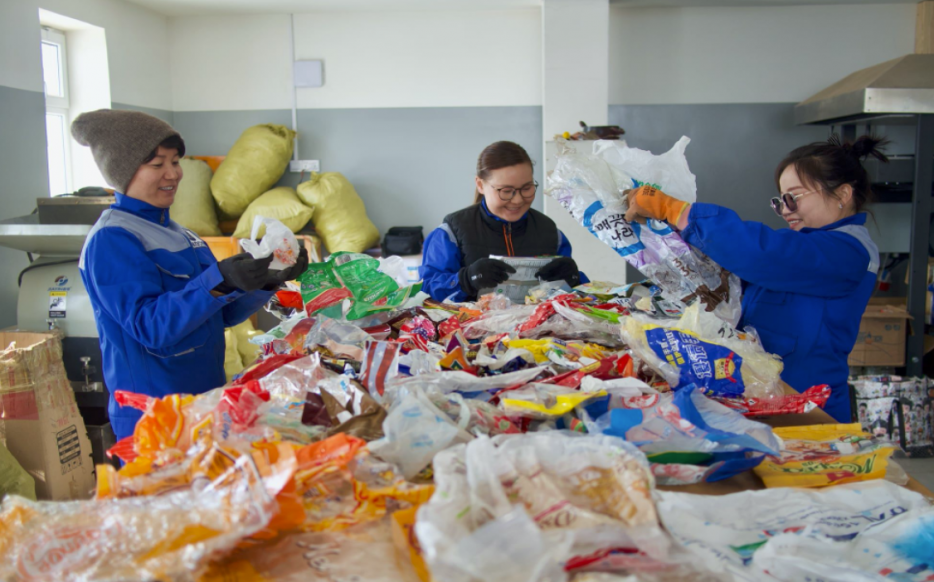
At city level, in Ulaanbaatar, the project has also:
-
Organized a “Training of Trainers” programme and involved 11 teachers of secondary schools and kindergartens;
-
Organized 22 awareness-raising training programmes for a total of 525 individuals in Ulaanbaatar city;
-
Organized performance of “Garbage Monster” play by Creative Bamboo theater for 240 children;
-
Organized the “Do not just throw away” campaign in cooperation with Ungu Nem NGO, Lantuun Dohio NGO and Plastic Center LLC. During this campaign, 20 tons of LDPE plastic waste were collected and recycled into latrine linings. As a result, a playground with eco-toilets was created for 500 children in an abandoned region of the city, which in turn protected an area of 2.000 km2 from soil and groundwater contamination.
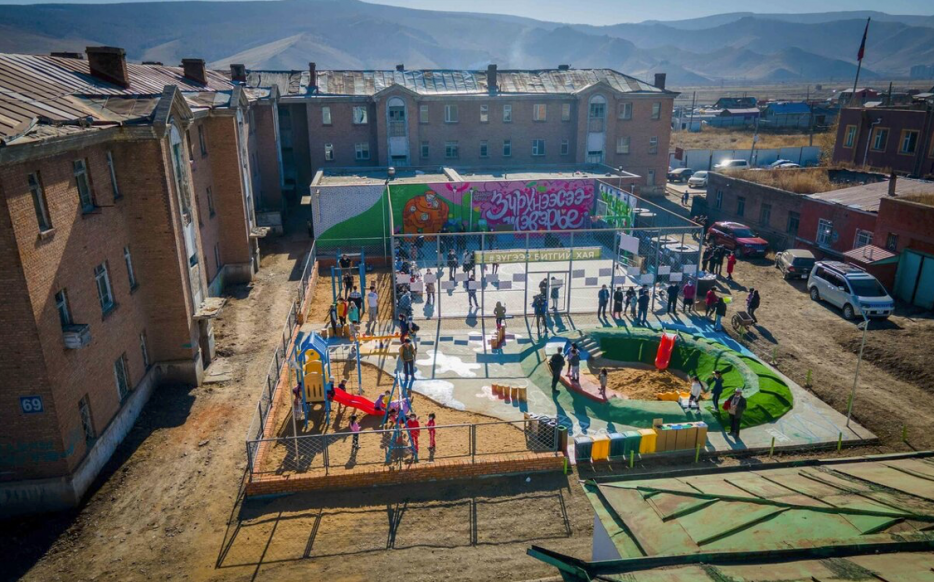
Pilot activities in smaller areas of the city:
SPRIM has also been working closely with three selected khoroos, representing different housing types in Mongolia. Bayanzurkh 15th khoroo includes all residential blocks, Songinokhairkhan 9th khoroo consists of ger areas, whereas Nalaikh 5th khoroo, located at a greater distance from the city centre, is a combination of both khoroos.
The Baseline Studies that were conducted, as well as on-location meetings revealed interesting insights, including the need for basic sorting bins and awareness-raising training sessions on waste management and sustainable consumption. It was evident that in order to promote recycling practices, residents need tools, knowledge and appropriate incentives that will lead them to switch to new responsible behaviours and habits.
SPRIM has provided residents of the three khoroos with a total of 77 sorting bins, organized capacity-building training sessions on waste management, provided them with viable transportation options that pay for recyclables and will follow-up on the sorting and transportation of waste. The targeted khoroos will lead as an example for other districts and even other regions in Mongolia.
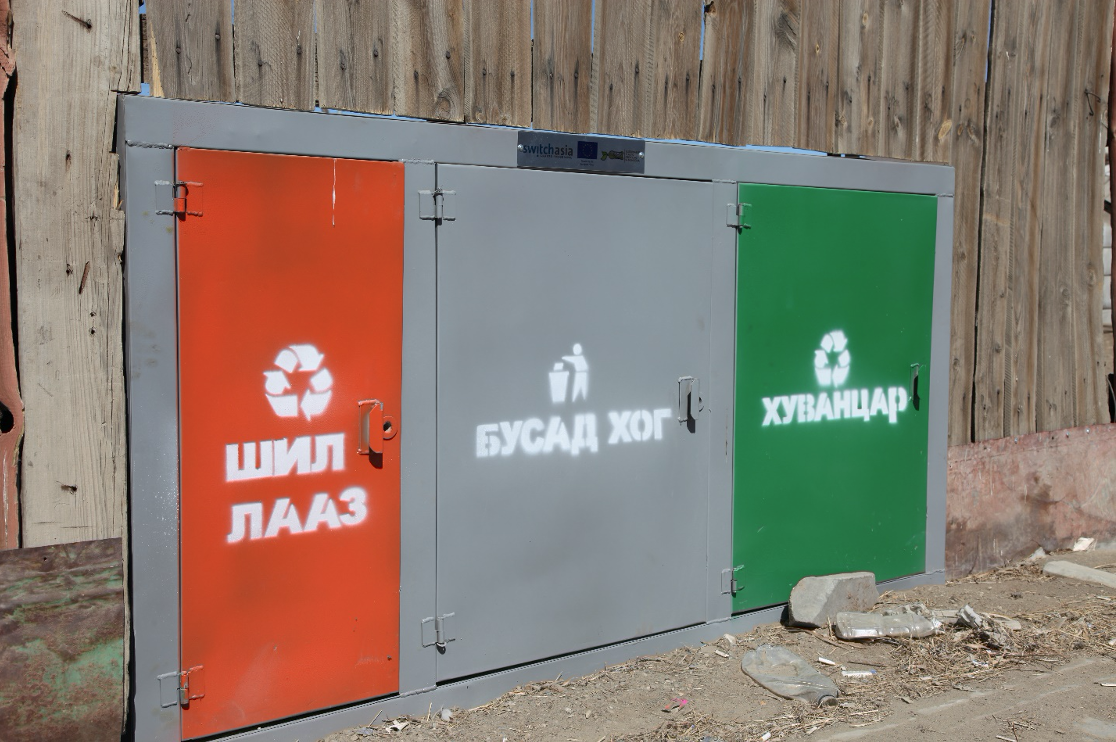
Training Local Organisations
The SPRIM project recognizes that to contribute to constant change in public behavior towards 5R practices, it is of utmost importance to educate and train local civil society organizations working on the ground to build their managerial and technical capacities. For this purpose, the “Civil Society Organizations for Change” training programme was organized involving 40 representatives of civil society organizations in Ulaanbaatar city. 29 organizations completed the programme and, additional activities will be organized to support them to jointly raise awareness of public.
While the transition to a circular economy is bound to be a slow and often challenging process, our project has laid the necessary groundwork and reached a significant number of people to raise awareness, promote waste reduction and sorting of waste. Our impact is most visible at project events organised for the public and it is important that everyone is conscious of their role in the overall scheme. SPRIM will continue to push forward at the policy level to improve waste management and support plastic recycling, said Jana Zilkova, Project Manager and Head of Mission, Caritas Czech Republic.
A Snapshot of Our Latest Research Work and Findings
Research Report on the existing policies and processes regarding the recycling sector, waste generation, production and collection in Mongolia (2021) (in Mongolian language)
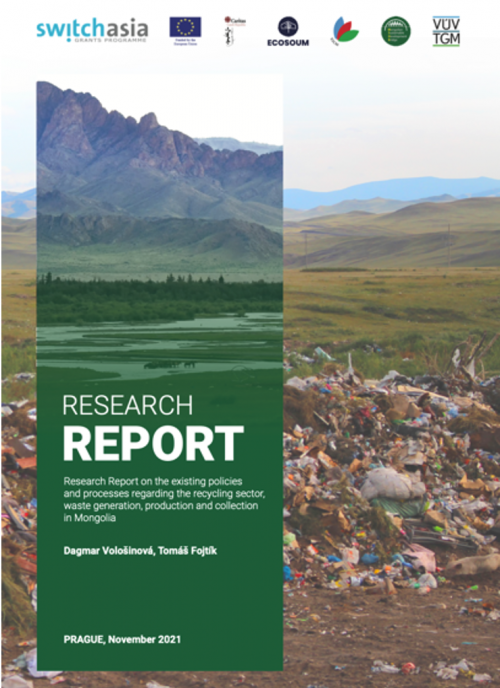 - Approximately 258 thousand tons of plastic waste (18% of all waste) is generated per year in Ulaanbaatar.
- Approximately 258 thousand tons of plastic waste (18% of all waste) is generated per year in Ulaanbaatar.
- 9.5% or approximately 860 tons of plastic waste is generated each year in Bulgan soum of Bulgan aimag.
- 18% or approximately 51 tons of plastic waste is generated each year in Khishig-Undur soum of Bulgan aimag.
- PET plastic accounts for 45% of the total plastic waste generated, while other types of plastics such as LDPE, PE, PP, HDPE and PVC account for the rest.
- There are 24 plastic recycling companies in Ulaanbaatar. These companies make up the majority of the city’s recycling industry (57%).
The Plastic Recycling Technology Gap Assessment Research Report (2022) (in Mongolian language)
The terminology for plastic recycling is complex and sometimes confusing due to the wide range of recycling and recovery activities. These activities can be classified in four categories:
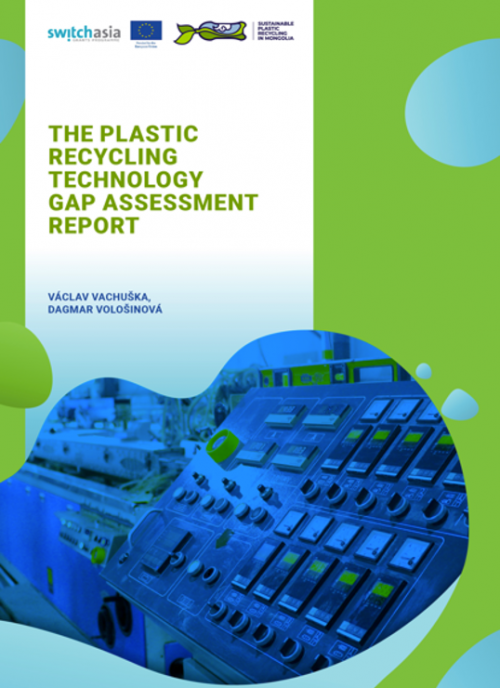
Primary: mechanical processing into a product with equivalent properties; Secondary: mechanical processing into products requiring less demanding properties; Tertiary: recovery of chemical components; and Quaternary: recovery of energy.
- All recycling companies in Ulaanbaatar use mechanical recycling of plastic waste. More than half of the plants use plastic extrusion technology, others use plastic waste injection molding or drum bottle technologies. 42% of the plastic recycling plants only produce plastic granules (semi-finished products).
- The annual production capacity of all recycling plants is 44,420 tons of plastics. This capacity is insufficient compared to the expected annual plastic waste generation.
- 64% of companies that participated in SPRIM survey had plans to increase their recycling capacity, expand their product range, and modernize their facilities. Some of them were looking for bank loans, investments to have their own factory building instead of renting, modernizing their equipment and producing final products instead of semi-finished products.
- 27% of companies had no plan to increase their recycling capacity because they have never reached its design capacity due to insufficient quantities of secondary raw materials, market competition, and secondary raw material price increase.
In 2021, SPRIM has also conducted an analysis of the financial constraints faced by plastic recycling MSMEs. This internal study identified macro-environmental constraints such as the tax environment, rising consumer prices, exchange rate fluctuations, customs duties and fees on equipment, and rising raw material prices as significant financial barriers for plastic-recycling MSMEs in Mongolia. To tackle these constraints, there is a need to improve the legal environment, as well as to systematically plan and address waste segregation and the transportation system.
Of the surveyed companies, 42% declared to be profitable, 5% not profitable, and 53% neither profitable nor loss-making.
This analysis further showed that low profitability was also due to the fact that the equipment used in the recycling plant was not operating at the installed capacity, the running cost of operating the equipment was high and overly dependent on human factors and the stability of the workforce. The need to prepare specialized technicians and intensify equipment upgrades were identified as priorities.
Plastic waste recycling MSMEs have a high demand for low-interest, long-term, low-collateral loan products. There is an increasing need to connect producers with banks and financial institutions and offer specialized green loan products and services. During the survey, the team found that MSMEs commonly faced struggles due to the scarcity and rising prices of raw materials (both secondary and primary), and the increase in transportation costs caused by the COVID-19 pandemics.
A Guidebook on How to Set up Waste Management at the Soum Level (2021) (in Mongolian language)
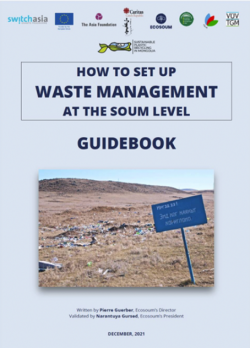 This detailed Guidebook provides practical guidelines and recommendations to help soum-level actors to set up their waste management systems. The Guidebook was structured to provide step-by-step guidelines from the first studies to awareness-raising and advocacy, detailing how to sort and manage each category of waste. This Guide is addressed primarily to soum administrations, which oversee the local waste management. More broadly, it also aims to benefit all soum-level actors willing to take action and improve the waste management situation in their soum. Most of the recommendations are also applicable in aimag centers and in many districts of Ulaanbaatar.
This detailed Guidebook provides practical guidelines and recommendations to help soum-level actors to set up their waste management systems. The Guidebook was structured to provide step-by-step guidelines from the first studies to awareness-raising and advocacy, detailing how to sort and manage each category of waste. This Guide is addressed primarily to soum administrations, which oversee the local waste management. More broadly, it also aims to benefit all soum-level actors willing to take action and improve the waste management situation in their soum. Most of the recommendations are also applicable in aimag centers and in many districts of Ulaanbaatar.
Photo credits: SWITCH-Asia SPRIM Project


